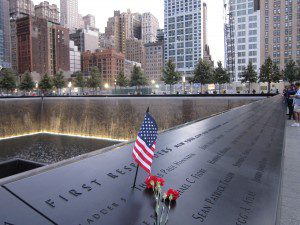By Zainab Chaudry
On the 13th anniversary of the September 11th terrorist attacks, our nation remembers the 3,000 lives that were senselessly taken that day.
As we salute the sacrifice of heroes who rushed to rescue and as we empathize with the pain of loved ones who grieve, I can’t help but reflect on the aftermath of the day that forever changed the lives of all Americans — especially the lives of American Muslims like my husband and me.
My husband and I had not yet met when 9/11 happened. But somehow our experiences and recollections are in many ways connected. As first generation Americans born in sprawling metropolises to Pakistani-American parents, we had a healthy appreciation for both the “American” and “Muslim” aspect of our identities.
On that day, I was beginning my first year as a pharmacy student; he was entering his first year of law school. I was sitting in a classroom in Maryland, preparing to take a quiz; he had just disembarked the PATH train at the World Trade Center in Manhattan.
When the impact of the first plane hitting the tower was felt, he was on an escalator. He noticed people running towards the exits. Pandemonium ensued, but no one seemed to know what was going on. He followed the mass of morning commuters and ran outside, helping others along the way.
A few moments later, as the second plane — United Airlines Flight 175 — crashed into the South tower of the World Trade Center, he stared in stunned disbelief at the broken sky above dotted by bodies of people desperately jumping from the tower. My husband describes the surrealism of the moment as being overshadowed by a distinct fear arising from his inner consciousness.
As events unfolded over the course of several hours, the seemingly impenetrable sense of security and self-assuredness we enjoyed evaporated like fresh morning dew on a petal wilting beneath the heat of a hot, summer sun. By this point, it was apparent that this was a terrorist attack, not an accident.
The day felt like a bad dream that would never end.
In our separate lives and in our different ways, Americans struggled to make sense of something that defies reason or logic. It would be days before we realized how drastically the course of our lives had been altered by circumstances beyond our control.
The hijackers’ identities were eventually revealed. As families grieved for their loved ones, and a nation reeled, President George Bush called for calm and unity amidst chaos. He visited a mosque in Washington six days after the attack, where he spoke eloquently against the harassment of Arabs and Muslims and called upon Americans to respect Islam.
Although the President’s words tempered the hatred and fear borne as a result of 9/11, they could not douse the flames of anger and hatred towards Islam and Muslims that swept through the nation.
Reports poured in of backlash against the American Muslim community, and millions of American Muslims became subjected to intense scrutiny. As they struggled to strike a balance between practicing their faith and fearing for their safety, some women removed their Islamic headscarves while other men shaved off their beards.
Neighbors began locking doors. Parents forbade children from attending mosques or MSA (college campus’ Muslim student organizations) events, or participating in any activities that identified them as Muslims.
Like other survivors, American Muslim survivors also struggled to cope with the trauma that they had witnessed. But because they were Muslim, their struggle was an unwelcome intrusion and therefore, endured in private.
Families of Muslim first responders — like Salman Hamdani, who died heroically trying to rescue others — not only suffered the loss of a loved one, but also found themselves ostracized, shunned and even shamed through the grieving process.
The events of 9/11 are a tragedy that has been memorialized in our minds and hearts over the last 13 years. But for American Muslims, who still suffer significant backlash as a consequence of the hijackers’ nationality and professed faith, it is a doubly bitter pill that constantly serves as a reminder that we still have a lot of work to do in educating neighbors and colleagues of the fact that true Islam is indeed a religion of peace.
That day shook the foundation of our existence, forced millions to re-examine their purpose in life, and has come to be a defining point for myself and countless others. It presents a challenge from which we cannot afford to back down.
Terrorists not only hijacked planes and flew them into buildings that fateful day, they also hijacked our nation’s sense of security and the religion of Islam. They robbed Americans of goodwill and left us with fear, anger and suspicion. They destroyed skyscrapers with their hatred and erected in their stead walls of mistrust.
Time heals wounds, but if not cared for properly, they fester and leave scars.
If we wish to heal fully, we must realize that our victory over the enemies who envy our freedoms lies not in sowing the seeds of hatred, but in nurturing seeds of tolerance. It exists not in excluding those who are different from us, but rather in embracing our nation’s diversity as its greatest strength.
Implementing these truths into our daily practice is the single, most noble way we can honor the memory of those whose lives were taken on that tragic September day.
Zainab Chaudry is the Maryland Outreach Manager of the Council on American Islamic Relations. CAIR is the nation’s largest Muslim civil rights and advocacy organization.












